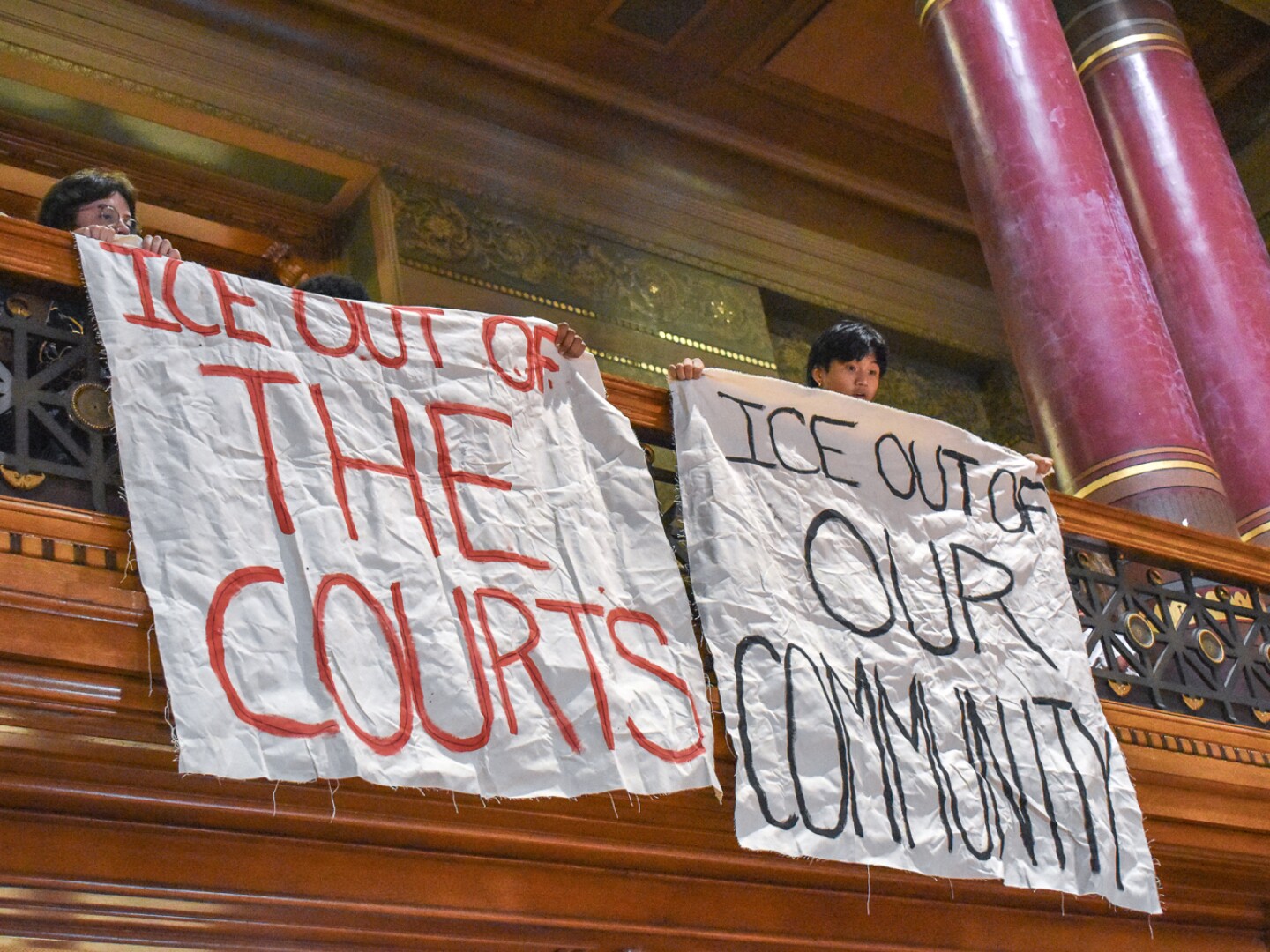As the Trump administration increases pressure on states and cities to have police assist with federal immigration enforcement, officials in Rhode Island’s capital are moving to impose new limits on how officers can cooperate.
Following a three hour hearing Monday evening, the Providence City Council’s committee on ordinance voted to advance a proposal introduced by Councilor Justin Roias in January to amend the city’s Community-Police Relations Act. Three members voted for the proposal and two, Committee Chairman Pedro Espinal and Councilor Oscar Vargas, abstained.
Over 50 residents and community advocates spoke before the committee, nearly all were against any relationship between the Providence Police Department and U.S. Immigration and Customs Enforcement (ICE).
“I do not want to feel like masked people could kidnap me or my neighbors off the street with support of the Providence Police and my tax dollars,” Rebecca Dupras, a Providence estate planning attorney, told the committee. “I want to feel that I can count on the police to protect me.”
Angel Lopez of the city’s Silver Lake neighborhood said he believes amending its policing rules will only make the city safer.
“Positive relationships must work both ways,” he said.
Among the proposed changes:
- Providence Police would be barred from complying with ICE requests to establish traffic perimeters for any federal agency attempting to detain undocumented immigrants
- The city would not be allowed to deputize officers as immigration officials under the Department of Homeland Security’s 287(g) program.
- The police would be prohibited from sharing personal data with federal immigration authorities, including state-issued IDs, licenses, names, addresses, dates of birth, fingerprints or biometric information.
- Schools, places of worship, health facilities and courts would be designated safe spaces, meaning federal immigration authorities can’t be granted access unless they have a judicial warrant or are “acting in response to a specific act of terrorism, national security threat or when there is the threat of imminent danger of violence.”
In an interview ahead of the meeting, Steven Brown, executive director for the Rhode Island ACLU, told the Rhode Current that he believes the proposed ordinance is important in ensuring future administrations don’t go back on policy that isn’t codified.
Enacted in 2017 under then-Mayor Jorge Elorza, the Providence Community-Police Relations Act prohibits officers from assisting with federal immigration enforcement regardless of the reason the person is being detained, unless there is a criminal warrant issued for a person in Providence police custody.
But how strictly police adhere to internal policy came into question after officers were filmed at the scene of an ICE arrest on Alverson Avenue on July 13.
At the time, Police Col. Oscar Perez told media outlets that officers responded only because ICE agents crashed their car, not to assist in ICE activity. However, body camera footage showed that some officers tried to assist federal immigration officials by asking a landlord if she could hand over her keys so ICE didn’t have to break down any doors in her home.
A review of the incident published by the Providence External Review Authority (PERA) in August found that police actions during the ICE raid “constituted prohibited assistance” in enforcing federal immigration policy.
“The assistance was operationally significant” the city’s oversight panel wrote.
PERA’s review recommended that the police department establish “clear operational guidelines” on its response to ICE or other federal agency requests for assistance related to immigration enforcement activities.
“Guidelines should include express instructions to department personnel that they are not to render any services that directly or indirectly assist federal agencies in conducting civil immigration enforcement,” the review states.
Providence Mayor Brett Smiley took some initial steps to codify those guidelines with an executive order issued on Sept. 22 reaffirming the city’s police department will only enforce local laws.
Smiley said in a statement to Rhode Island Current Monday that “many of the updates” in the council’s proposal were in-line with his order and that local protections must be assessed by officials.
However, the mayor does have one major concern: A provision that allows community organizations to challenge potential violations in court.
“In addition to opening up the city to legal liability, it creates a parallel process to our already existing external authority, PERA, who should have the responsibility to review these matters,” he said.
But Brown of the ACLU said allowing court challenges will ensure Providence police remain accountable for following their own policy.
“A lot of the people who might be most directly affected by violations are unlikely to pursue legal action because of their immigration status or the fear of taking such a public stand,” he said.
City Councilor Miguel Sanchez, a co-sponsor of the proposed ordinance, said the city needs to be held to higher standards in upholding its own laws.
“In today’s day and age, folks don’t want to be held accountable,” he said. “As public servants, that’s really disappointing to me.”
State Rep. David Morales, a progressive Democrat running to unseat Smiley next year, was not present for the hearing but provided written testimony in support of amending the city’s policing policy.
“At a time when trust in our public institutions is fragile and fear among immigrant communities is growing, Providence must take bold, concrete steps to affirm that it stands with and for all of our neighbors,” Morales wrote.
GOP mayoral candidate Allen Waters was the only speaker Monday who was fully against the amending the ordinance.
“I support the Providence police,” he said near the end of the hearing. “I support Immigration Customs Enforcement — we should not compete against them”
He was promptly booed by the over two dozen remaining members of the public seated in the council chamber.
Roias’ proposed ordinance now heads to the full council for consideration, where it will require two passages.
This story was originally published by the Rhode Island Current.







